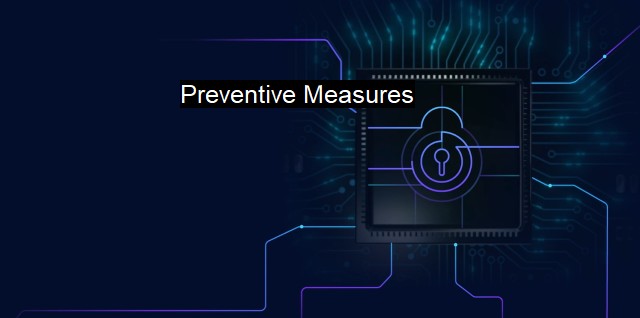What are Preventive Measures?
Protecting your Business and Data: The Importance of Preemptive Measures in Cybersecurity and Antivirus Strategy
Preventive measures in the context of cybersecurity and antivirus refer to strategic actions and strategies geared towards preventing unauthorized access, tampering, and damage to computer networks, systems, and digital resources. It's a vital aspect, considering our present world's heavy reliance on digital resources. Globally, cybersecurity threats have been consistently escalating, leading to compromised personal/business networks, monetary loss, and often irreparable damage to reputation and trust.The fundamental premise of preventive measures is that preventing a problem is more cost-effective and efficient compared to dealing with the aftermath of a damaging cyberattack. it aims to create a robust protective barrier against unlawful infiltration or hacking attempts to mitigate potential threats which can range from malicious software like worms, Trojans, ransomware to social engineering attacks, or phishing that use manipulation or deception to trick users into revealing sensitive or personal information.
Outfitting computer systems with antivirus software is a common portrayal of a preventive measure. Antivirus software is designed to detect, remove, and defend against many forms of malware that pose threats to a device's pristine condition and functionality. It performs regular scans of a computer system's files and programs, checking with a virus database that is regularly updated to inspect any known threats or anomalies.
Aside from installing antivirus software, preventive measures also involve the use of tools such as firewalls, spyware checking and deletion tools, and applications that protect against browser hijacking. Updating systems with the latest patches or software versions is a crucial measure too, as vulnerabilities in outdated software often provide loopholes for hackers to exploit.
One should be aware of the significance of data encryption since valuable data, whether in transit over a network or at rest in storage, is a potential target for security breaches. Encryption involves transforming this important data into a form which is not easy to understand or access by unauthorized individuals, thus safeguarding it from prying eyes.
Preventive measure pedagogy is embedded in the concept of user vigilance. Regular user education is helpful in spreading awareness about the various forms of cyber threats and deceptive tactics employed by cybercriminals. This awareness helps promote responsible online behavior and highlights the necessity of strong, unique passwords while exercising caution while going through emails or navigating websites.
Organizations must continually assess network vulnerabilities through penetration testing and audits to identify and fix detected weaknesses. Implementing network access controls to enforce who and what can access network resources reduces the unauthorized access risk. The purpose is to keep pace with the evolving tactics of cyber attackers.
Preventive measures also underline the significance of backup strategies in averting a worst-case scenario where the primary data is unrecoverable due to a ransomware attack or catastrophic system failure. Regularly backing up data and essential files to a separate, secure destination can be a lifesaver when primary data recovery is not possible.
At the heart, preventive measures value proactive over reactive approach, absolutely vital in the growingly sophisticated cyber threat landscape. The intent is not just to get the system up and running smoothly but also to maintain the confidentiality, integrity, and availability of digital resources, safeguarding users' trust and ensuring a fortified digital environment. The overbearing theme is the fundamental rule of cybersecurity: It's not about if you'll be attacked, but when. Hence, preventive measures in cybersecurity and antivirus practices are the sturdy shield in the arsenal against the constant threat of digital damage today.

Preventive Measures FAQs
What are preventive measures in cybersecurity?
Preventive measures in cybersecurity are measures that are taken to prevent security breaches and protect computer systems, networks, and data from unauthorized access or attacks. These measures include using antivirus software, firewalls, encryption, and taking other security measures to ensure the safety of digital assets.Why is it important to take preventive measures in cybersecurity?
It is important to take preventive measures in cybersecurity because cyber threats are constantly increasing, and the consequences of a security breach can be severe. Preventive measures can help protect sensitive data, prevent financial losses, and ensure the continuity of business operations.What is antivirus software?
Antivirus software is a program designed to prevent, detect, and remove viruses and other malware from a computer system or network. It can scan files and programs for malicious code and block or quarantine them to prevent infection.How can I ensure the effectiveness of my preventive measures?
To ensure the effectiveness of preventive measures, it is important to keep them up to date and regularly review and update security policies and procedures. Regularly backing up data and testing disaster recovery plans can also help ensure the continuity of business operations in the event of a security breach. It is also important to provide regular security training for employees to maintain awareness of potential threats and best practices for security.| | A | | | B | | | C | | | D | | | E | | | F | | | G | | | H | | | I | | | J | | | K | | | L | | | M | |
| | N | | | O | | | P | | | Q | | | R | | | S | | | T | | | U | | | V | | | W | | | X | | | Y | | | Z | |
| | 1 | | | 2 | | | 3 | | | 4 | | | 7 | | | 8 | | |||||||